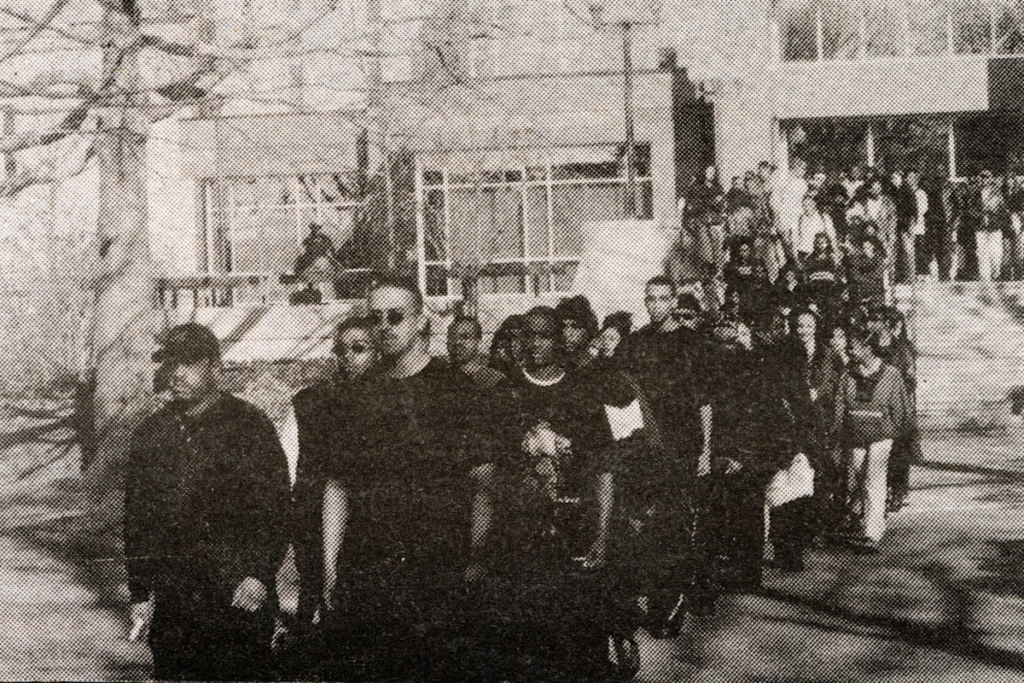
KINGSTON, R.I. – Feb. 26, 2024 – In December 1998, just six years after the takeover of Taft Hall on the University of Rhode Island campus, a new student group dedicated to furthering the cause of racial justice at URI rose to prominence. On Thursday, Feb. 29, the University’s Multicultural Student Services Center and Talent Development Program will commemorate the 25th anniversary of the Brothers United for Action (BUA) student protests, celebrating the work of the organization and the progress made toward fostering a more inclusive campus for all URI students.
The event will begin with a community gathering featuring music and performances at the Multicultural Student Services Center before moving to a more formal program at the Memorial Union that will include a speaking program, dinner and the screening of a new documentary film on the BUA by URI student filmmaker Cristobal Bustos ‘25.
“It is important not only that we take this moment to honor and recognize the work and sacrifices made by members of the BUA, but also that we look ahead and acknowledge the work we still have to do,” said MSSC assistant director Robert W. Britto-Oliveira, who planned the celebration. “It is my hope that this event will serve to educate our current scholars – especially those of marginalized populations – to see the instrumental changes that were made by their predecessors and to inspire them to speak up and use their voices to enact positive change.”
Brothers United for Action was formed in the fall of 1997, meeting late each Wednesday afternoon. The group captured the attention of the campus following their activism in response to The Good Five Cent Cigar’s 1998 printing of a cartoon centered on affirmative action that was perceived as racist. The resulting protests, including a march from Taft Hall to the Memorial Union, touched off debates over free speech, thrust the University into the national spotlight and raised greater awareness of racial tension on campus.
The group developed Two Demands and Ten Points of Light, which were presented to then-URI President Robert L. Carothers and, in May 1999, a mediated agreement was reached and witnessed by Josephine Carabello from the U.S. Department of Justice. Their actions resulted in the increased hiring of diverse faculty and staff; additional financial support for students of color and from disadvantaged backgrounds; and a diversified curriculum.
“What comes shining through is that as frustrated and disappointed as people were at the time in their university, they were willing to lay themselves on the line to make this place better,” said Markeisha Miner, vice president for community, equity and diversity. “They not only sacrificed–they were still juggling their studies, work and everything else—while engaged in advocacy and activism to push this institution to where it claimed it wanted to be, but they are still engaged. And that is what I find so encouraging.”
That ongoing involvement inspires more recent and future alumni like Britto-Oliveira and Bustos who continue to remain engaged and involved with the University, pushing it forward.
“They take that responsibility seriously,” said Miner. “The privilege of keeping that memory alive and stewarding it, and building on it together for the benefit of future generations of URI grads.”
The event will begin at 4:30 p.m. on Feb. 29 in the Multicultural Student Services Center, and will feature a performance by members of the Alima International Dance Association at URI, a spoken word performance by alumnus Stephen Larbi ’11, music provided by Marlin On the Keys (Marlin DaCruz 19′), and remarks from alumna Sarah Monteiro ’08, co-chair of the URI Alumni of Color Network.
At 6 p.m. the event will move to the Ram’s Den in the Memorial Union and will feature remarks by University officials, BUA alumni and current students, along with catering by Gee Gee’s Southern Cuisine and a screening of Bustos’ documentary.
# # #
